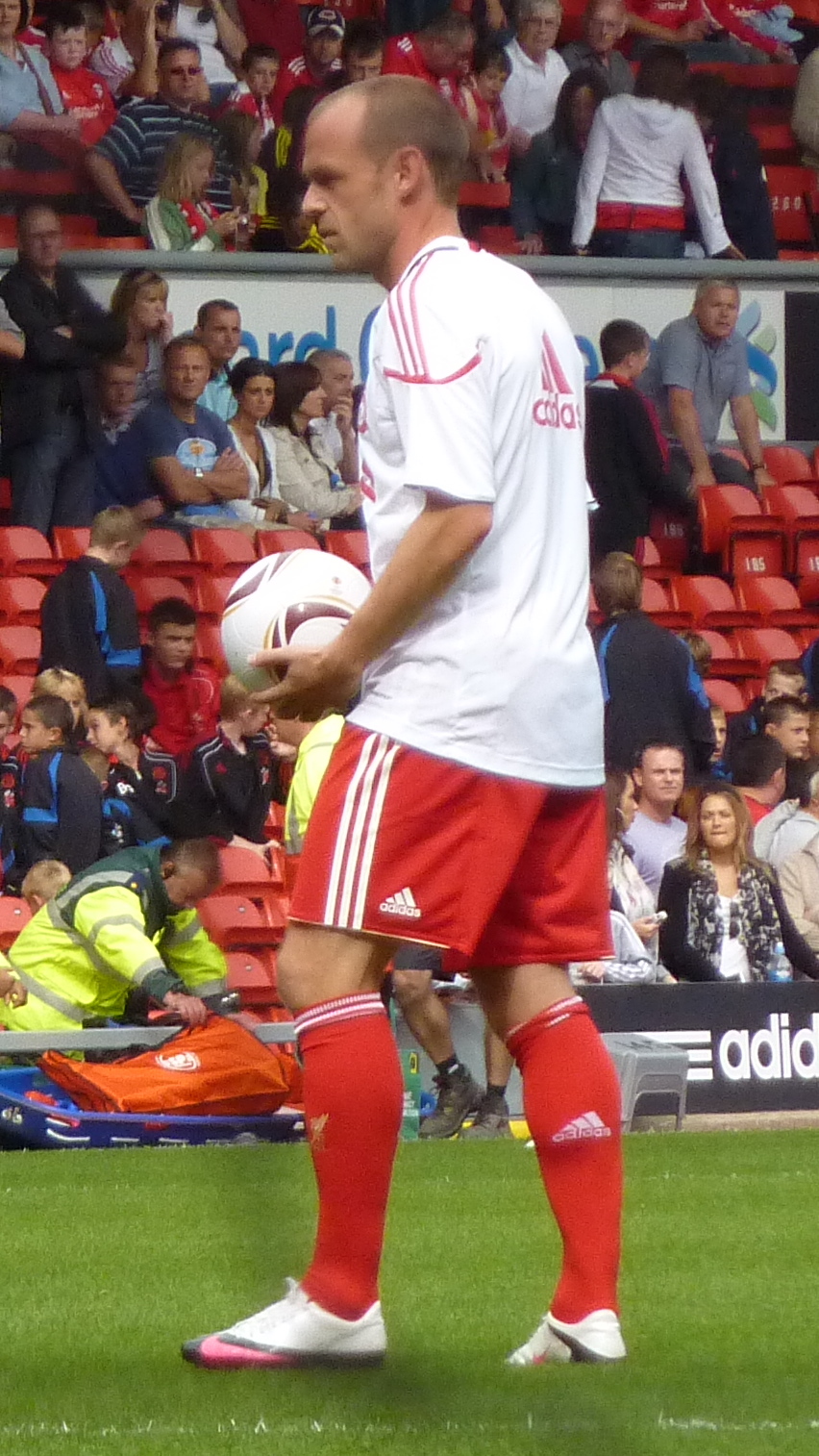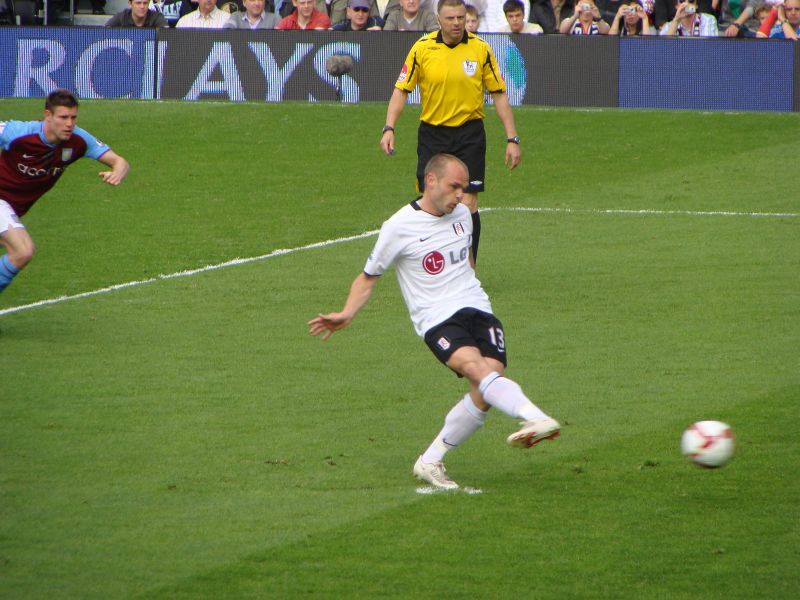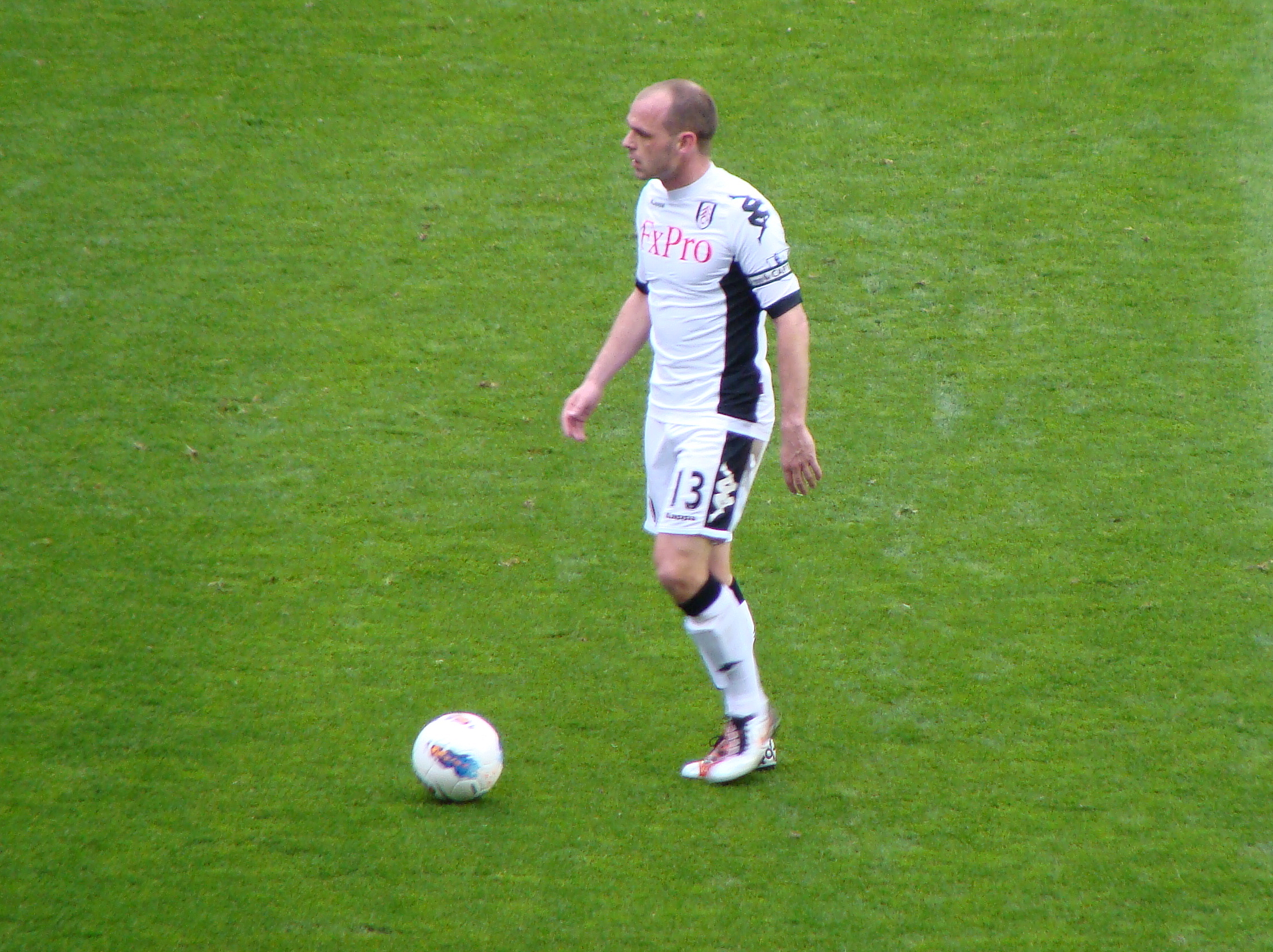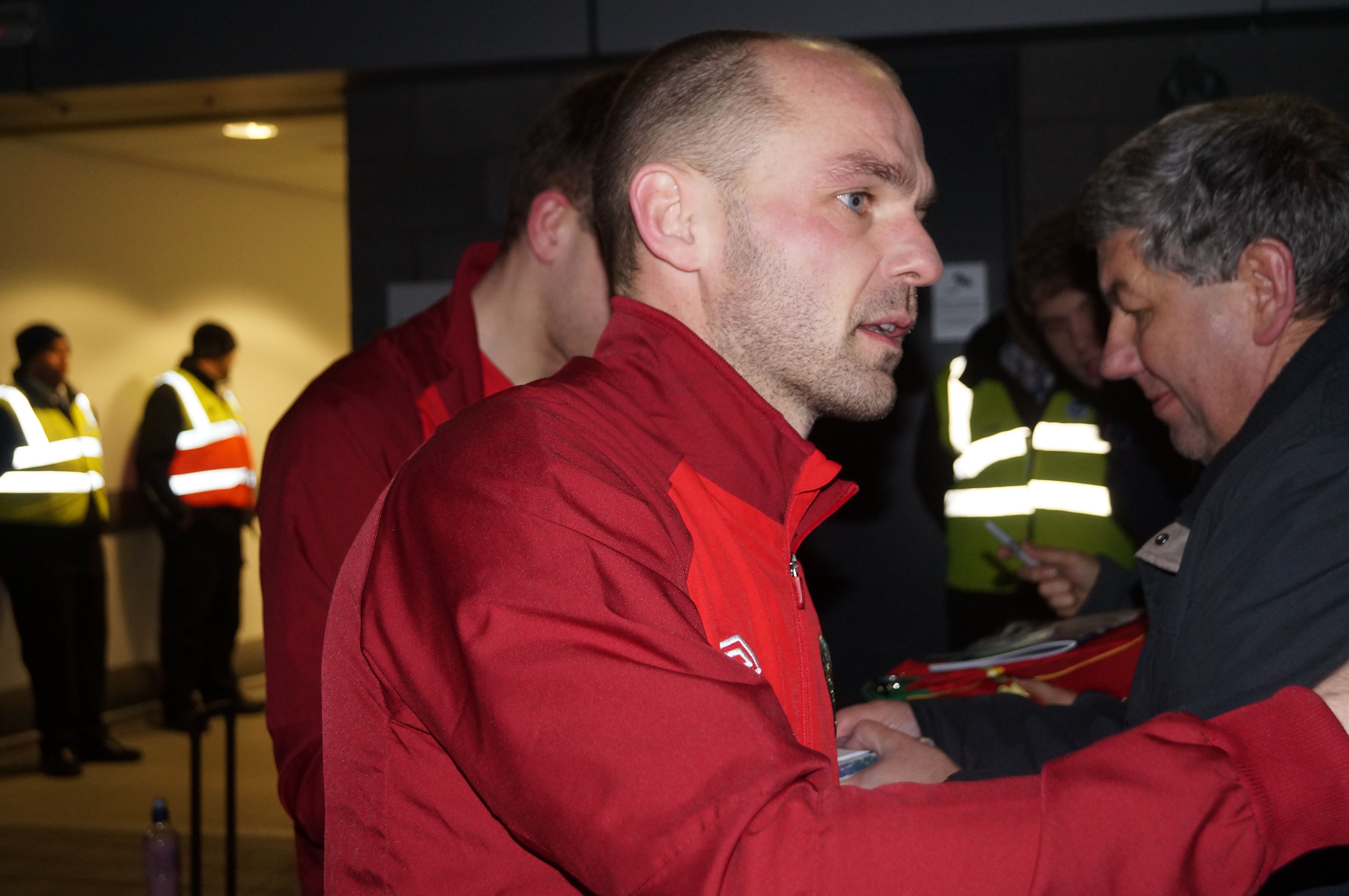1. Early Life and Youth Career
Daniel Ben Murphy's early life was marked by his burgeoning football talent, which was nurtured through a renowned youth academy and saw him represent England at various youth levels.
1.1. Childhood and Early Football Development
Daniel Ben Murphy was born on 18 March 1977, in Chester, Cheshire, England. He began his football journey as a trainee at Crewe Alexandra, a club renowned for its youth development. Murphy highly credited Crewe's manager, Dario Gradi, as a significant mentor in his footballing education. He made his first-team debut for Crewe as a 16-year-old on 7 December 1993, coming on as a substitute in a 3-2 away victory over Bradford City in the Football League Trophy. He scored his first goal for the club on his home debut, netting the winner in a 4-3 league victory against Preston North End. During his time at Crewe's Gresty Road stadium, Murphy primarily played as a deep-lying forward, often scoring spectacular goals from long range and set pieces. He formed a prolific attacking partnership with striker Dele Adebola. Murphy's contribution was pivotal in helping Crewe achieve promotion to the second tier of English football for the first time since 1896. This promotion was secured after Crewe finished third in the Second Division and subsequently defeated Brentford 1-0 at Wembley Stadium in the 1997 play-off final.
In November 2016, amidst the widespread United Kingdom football sexual abuse scandal, Murphy publicly and strongly defended Gradi's reputation, highlighting his positive influence as a mentor.
1.2. Youth National Team Career
Murphy was a regular fixture in England's youth national teams. He made his debut for the England national under-18 team on 24 July 1994, scoring as a substitute in a 3-3 friendly draw against Norway. He made his first start for the U18s two days later in a 3-2 home win over the same opposition. He concluded his under-18 career with seven appearances and five goals between 1994 and 1995.
In 1997, Murphy was part of the England under-20 team that participated in the 1997 FIFA World Youth Championship in Malaysia. He debuted at this level as a starter in England's opening match, a 2-1 victory over the Ivory Coast on 18 June 1997. Just two days later, he scored a hat-trick in England's 5-0 win against the United Arab Emirates. All four of Murphy's appearances for the under-20 squad occurred during this tournament, where England's campaign ended on 26 June with a 2-1 loss to Argentina in the round of 16.
He debuted for the England under-21 team on 9 September 1997, starting in a 1-0 home win against Moldova during the 1998 UEFA European Under-21 Championship qualification. Murphy was also included in the squad for the 2000 UEFA European Under-21 Championship held in Slovakia, where he played in all three of England's group stage matches before their elimination. He accumulated five appearances for the under-21 team between 1997 and 2000.
2. Professional Club Career
Murphy's professional club career was extensive, taking him through several prominent English clubs where he contributed to significant successes and left a lasting impact.
2.1. Crewe Alexandra (1993-1997)
As a youth product of Crewe Alexandra, Murphy quickly progressed to the first team. He debuted at 16 on 7 December 1993 and scored in his home debut match against Preston North End. Predominantly playing as a deep-lying forward, he was known for his spectacular long-range and set-piece goals. Murphy's contributions were instrumental in Crewe Alexandra's promotion to the second tier of English football in 1997, a feat achieved through a play-off final victory at Wembley Stadium.
2.2. Liverpool (1997-2004)

Murphy signed for Premier League club Liverpool in 1997 for an initial fee of 1.50 M GBP. His debut came on the opening day of the 1997-98 season in a draw with Wimbledon. However, he initially struggled to establish himself in the team, making only one league appearance during the subsequent season. He was then sent back to Crewe Alexandra on loan, where he helped his former club avoid relegation. Upon returning to Liverpool, Murphy successfully secured a regular place in the squad.
Although naturally a central midfielder, Murphy often played as a wide midfielder due to stiff competition for central positions, particularly from teammates like Steven Gerrard and Dietmar Hamann. His tenure at Liverpool was highly successful, highlighted by a historic cup treble in 2001, which included the FA Cup, UEFA Cup, and League Cup. The team also achieved a Premier League second-place finish in 2002. In 2003, Murphy further contributed to the team's success by winning the League Cup, where Liverpool defeated Manchester United. Notably, he had missed the 2001 League Cup final due to injury.
During the 2001-02 season, as he solidified his role as a key player, Liverpool's assistant manager Phil Thompson lauded Murphy's versatility and described him as "probably the most tactically aware player that we have." Despite a generally disappointing 2002-03 season for Liverpool, which saw the club finish fifth, Murphy enjoyed a strong individual campaign, scoring 12 goals and being voted the supporters' player of the season. He also developed a notable habit of scoring the decisive goal in 1-0 away victories against Manchester United, achieving this remarkable feat three times in four seasons (2000-01, 2001-02, and 2003-04).
2.3. Charlton Athletic (2004-2006)
In August 2004, Murphy transferred to Charlton Athletic on a four-year contract for a fee of 2.50 M GBP. During his initial season at Charlton, Murphy found it challenging to replicate the consistent form he had displayed at Liverpool. However, in the first three months of the 2005-06 season, he experienced a resurgence, scoring several goals and re-emerging as a potential option for the England national team. His impressive performances during this period earned him the Premier League Player of the Month award for September.
2.4. Tottenham Hotspur (2006-2007)
On 31 January 2006, Murphy made a move to Tottenham Hotspur, signing for a fee of 2.00 M GBP. During the remainder of that season, his appearances for the club were limited. He scored his first goal for Tottenham on 1 October 2006, netting just 39 seconds into a 2-1 victory over Portsmouth. Despite this early impact, Murphy found it difficult to establish himself as a regular starter at Tottenham. However, he later clarified that, contrary to media reports, there was no disagreement or falling out between him and then-manager Martin Jol.
2.5. Fulham (2007-2012)

Fulham acquired Murphy's contract from Tottenham on 31 August 2007. At Fulham, he quickly cemented his place as a regular starter, featuring in 43 matches and scoring six goals in his first season. A crucial moment came on 11 May 2008, when his rare header secured a 1-0 away win against Portsmouth, ensuring Fulham's Premier League survival. Following this achievement, Murphy praised manager Roy Hodgson for his "key role" in the team avoiding relegation. At the end of the season, Murphy signed a new one-year contract with an option for an additional year and was subsequently appointed club captain for the 2008-09 season.
On 9 November 2008, Murphy scored his 100th club career goal from a penalty kick as Fulham defeated Newcastle United 2-1. He scored another penalty when Fulham beat title-contending Manchester United at home for the first time in 45 years. The option on Murphy's contract was exercised during the season. In August 2009, amidst interest from clubs such as Birmingham City and Stoke City, he signed another contract extension, keeping him at Fulham until June 2011.
Murphy missed two months early in the 2009-10 season due to a knee ligament injury. Despite this setback, he went on to captain Fulham to their first-ever European final, the 2010 UEFA Europa League final. En route to the final, Fulham eliminated formidable opponents including Juventus, reigning champions Shakhtar Donetsk, Bundesliga champions VfL Wolfsburg, and Hamburger SV. Ahead of the semi-final, Murphy expressed that merely reaching the final "would be one of the greatest achievements of our history." Fulham ultimately lost the final 2-1 to Atlético Madrid, with the deciding goal scored just four minutes from the end of extra time.

The 2010-11 season began with a new manager, Mark Hughes, who replaced Roy Hodgson. In October, Murphy sparked controversy with comments blaming managers for dangerous tackles made by players. While his stance found support from his former mentor Dario Gradi, it drew significant criticism from other managers, including Sam Allardyce, Tony Pulis, and Mick McCarthy. In response to the backlash, Murphy stated his comments had been "blown out of all proportion." In late January 2011, Murphy signed yet another contract extension, securing his presence at Fulham until June 2012. The day after signing this new deal, he scored his first two goals of the season as Fulham decisively defeated his former club Tottenham 4-0 in the fourth round of the FA Cup. Manager Mark Hughes praised Murphy for his role in helping the club navigate a challenging period and avoid relegation.
Ahead of the 2011-12 season, Murphy expressed confidence in his ability to play a major role, declaring himself "fitter than ever." After making 49 appearances and scoring seven goals across all competitions in his final season, he was released by Fulham. This occurred because he and manager Martin Jol, who had succeeded Mark Hughes, could not agree on terms for a contract extension. Despite his departure, it was noted that in his last season at Fulham, Murphy created more goalscoring chances than any other player in the top-flight.
2.6. Blackburn Rovers (2012-2013)

On 25 June 2012, Murphy signed a two-year contract with Championship club Blackburn Rovers. He stated that his decision to move to Blackburn was driven by the desire for regular playing time and that it felt like the appropriate moment to leave Fulham. He scored his first goal for Blackburn on 6 November 2012 in a 2-2 draw against Huddersfield Town. In March 2013, Murphy was succeeded as Blackburn's captain by Scott Dann. On 1 July, despite his willingness to stay at the club for another season, Murphy's contract was terminated by mutual consent. During his time at Blackburn, Murphy received praise from manager Gary Bowyer for his valuable assistance and advice during Bowyer's management tenure.
3. Senior National Team Career
Murphy played nine times for the England senior team and scored one goal between 2001 and 2003. His debut came on 10 November 2001, as a 58th-minute substitute in a 1-1 friendly draw at home against Sweden. His only goal for the national team was scored on 17 April 2002, with a deflected shot in a 4-0 home victory over Paraguay in a friendly match.
Murphy was initially called up to England's squad for the 2002 FIFA World Cup in South Korea and Japan, serving as a replacement for the injured Steven Gerrard. However, he himself had to withdraw from the squad after sustaining a foot injury, an unfortunate turn of events that prevented him from participating in the tournament.
4. Post-Playing Career
Following his professional playing career, Daniel Murphy transitioned into a prominent role in football media and analysis. On 18 August 2013, he made his debut as a pundit on the BBC program Match of the Day. On 10 October 2013, he officially announced his retirement as a player, stating his intention to continue his media work and pursue coaching badges. He established a notable career as a pundit for the UK radio station Talksport and has continued to serve as a football analyst and commentator for the BBC since 2013.
5. Personal Life
Daniel Murphy is part of a footballing family, being the nephew of former professional footballers Paul Futcher, Graham Futcher, and Ron Futcher, and the cousin of Ben Futcher. In 2004, Murphy married actress Joanna Taylor. The couple had two children together before their separation in 2017.
In 2024, Murphy publicly disclosed his personal struggles after retiring from football. He revealed that he found it difficult to cope with the absence of football in his daily life and, as a result, turned to cocaine and cannabis. At one point, he developed an addiction to cocaine.
6. Honours and Achievements
Murphy's professional career was marked by several significant team and individual accolades across different clubs.
- Crewe Alexandra
- Football League Third Division third-place promotion: 1993-94
- Football League Second Division play-offs: 1997
- Liverpool
- FA Cup: 2000-01
- Football League Cup: 2000-01, 2002-03
- FA Charity Shield: 2001
- UEFA Cup: 2000-01
- UEFA Super Cup: 2001
- Premier League: runner-up 2001-02
- Fulham
- UEFA Europa League runner-up: 2009-10
- Individual
- PFA Team of the Year: 1996-97 Second Division
- Liverpool Player of the Season: 2002-03
- Premier League Player of the Month: November 2001, September 2005
7. Career Statistics
Murphy's extensive career statistics demonstrate his consistent presence and contribution across various competitions at both club and international levels.
7.1. Club
| Club | Season | League | FA Cup | League Cup | Europe | Other | Total | |||||||
|---|---|---|---|---|---|---|---|---|---|---|---|---|---|---|
| Division | Apps | Goals | Apps | Goals | Apps | Goals | Apps | Goals | Apps | Goals | Apps | Goals | ||
| Crewe Alexandra | 1993-94 | Third Division | 12 | 2 | 0 | 0 | 0 | 0 | - | 2 | 1 | 14 | 3 | |
| 1994-95 | Second Division | 35 | 5 | 0 | 0 | 1 | 0 | - | 5 | 0 | 41 | 5 | ||
| 1995-96 | Second Division | 42 | 10 | 3 | 1 | 4 | 0 | - | 4 | 1 | 53 | 12 | ||
| 1996-97 | Second Division | 45 | 10 | 4 | 3 | 2 | 0 | - | 6 | 2 | 57 | 15 | ||
| Total | 134 | 27 | 7 | 4 | 7 | 0 | - | 17 | 4 | 165 | 35 | |||
| Liverpool | 1997-98 | Premier League | 16 | 0 | 1 | 0 | 0 | 0 | - | - | 17 | 0 | ||
| 1998-99 | Premier League | 1 | 0 | 0 | 0 | 2 | 0 | 1 | 0 | - | 4 | 0 | ||
| 1999-2000 | Premier League | 23 | 3 | 2 | 0 | 2 | 3 | - | - | 27 | 6 | |||
| 2000-01 | Premier League | 27 | 4 | 5 | 1 | 5 | 4 | 10 | 1 | - | 47 | 10 | ||
| 2001-02 | Premier League | 36 | 6 | 2 | 0 | 1 | 0 | 15 | 2 | 2 | 0 | 56 | 8 | |
| 2002-03 | Premier League | 36 | 7 | 3 | 1 | 4 | 2 | 12 | 2 | 1 | 0 | 56 | 12 | |
| 2003-04 | Premier League | 31 | 5 | 2 | 1 | 2 | 2 | 7 | 0 | - | 42 | 8 | ||
| Total | 170 | 25 | 15 | 3 | 16 | 11 | 45 | 5 | 3 | 0 | 249 | 44 | ||
| Crewe Alexandra (loan) | 1998-99 | First Division | 16 | 1 | - | - | - | - | 16 | 1 | ||||
| Charlton Athletic | 2004-05 | Premier League | 38 | 3 | 3 | 1 | 2 | 1 | - | - | 43 | 5 | ||
| 2005-06 | Premier League | 18 | 4 | 0 | 0 | 3 | 1 | - | - | 21 | 5 | |||
| Total | 56 | 7 | 3 | 1 | 5 | 2 | - | - | 64 | 10 | ||||
| Tottenham Hotspur | 2005-06 | Premier League | 10 | 0 | - | - | - | - | 10 | 0 | ||||
| 2006-07 | Premier League | 12 | 1 | 1 | 0 | 3 | 0 | 3 | 0 | - | 19 | 1 | ||
| Total | 22 | 1 | 1 | 0 | 3 | 0 | 3 | 0 | - | 29 | 1 | |||
| Fulham | 2007-08 | Premier League | 33 | 5 | 1 | 1 | 1 | 0 | - | - | 35 | 6 | ||
| 2008-09 | Premier League | 38 | 5 | 5 | 1 | 1 | 1 | - | - | 44 | 7 | |||
| 2009-10 | Premier League | 25 | 5 | 3 | 0 | 0 | 0 | 13 | 2 | - | 41 | 7 | ||
| 2010-11 | Premier League | 37 | 0 | 3 | 2 | 2 | 0 | - | - | 42 | 2 | |||
| 2011-12 | Premier League | 36 | 2 | 2 | 1 | 0 | 0 | 11 | 3 | - | 49 | 6 | ||
| Total | 169 | 17 | 14 | 5 | 4 | 1 | 24 | 5 | - | 211 | 28 | |||
| Blackburn Rovers | 2012-13 | Championship | 33 | 1 | 2 | 1 | 0 | 0 | - | - | 35 | 2 | ||
| Career total | 600 | 79 | 42 | 14 | 35 | 14 | 72 | 10 | 20 | 4 | 769 | 121 | ||
7.2. International
| National team | Year | Apps | Goals |
|---|---|---|---|
| England | 2001 | 1 | 0 |
| 2002 | 4 | 1 | |
| 2003 | 4 | 0 | |
| Total | 9 | 1 | |
:England score listed first, score column indicates score after each Murphy goal
| No. | Date | Venue | Cap | Opponent | Score | Result | Competition |
|---|---|---|---|---|---|---|---|
| 1 | 17 April 2002 | Anfield, Liverpool, England | 3 | Paraguay | 2-0 | 4-0 | Friendly |
8. Criticism and Controversies
Throughout his career and post-retirement, Daniel Murphy was involved in a few notable controversies. In November 2016, during the unfolding United Kingdom football sexual abuse scandal, Murphy strongly defended his former youth coach Dario Gradi. He maintained Gradi's positive reputation, which drew attention due to the sensitive nature of the allegations surrounding football coaches at the time.
Another instance of controversy arose in October 2010 when Murphy made public comments regarding dangerous tackles in football, placing blame on managers for encouraging such aggressive play. His remarks sparked a debate within the football community, with some figures like Dario Gradi supporting his perspective, while other prominent managers, including Sam Allardyce, Tony Pulis, and Mick McCarthy, heavily criticized his statements. Murphy subsequently clarified that his comments had been "blown out of all proportion."
9. Legacy and Reception
Daniel Murphy's legacy in English football is characterized by his versatility, tactical intelligence, and significant contributions to the clubs he represented, particularly Liverpool and Fulham. He was often praised by coaches and peers, such as Phil Thompson, for his deep understanding of the game and adaptability across midfield positions. His knack for scoring crucial goals, especially his repeated match-winning strikes against Manchester United at Old Trafford, cemented his reputation as a big-game player. His leadership qualities were also evident through his captaincy at both Fulham and Blackburn Rovers.
Beyond his on-field achievements, Murphy's transition into a respected football pundit and analyst has allowed him to maintain a prominent voice in the sport, offering insights and commentary on current games and issues. His public revelation in 2024 about his struggles with cocaine and cannabis addiction after retirement added a layer of vulnerability and honesty to his public persona, opening up important conversations about mental health and post-career challenges for athletes. This candidness, alongside his professional accomplishments, contributes to a complex and humanized public perception of his overall legacy.